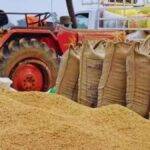Main Points In Hindi (मुख्य बातें – हिंदी में)
-
बीज गुणवत्ता में वृद्धि: नाइजीरिया में कृषि क्षेत्र के हितधारकों ने रतालू बीज की गुणवत्ता को बढ़ावा देने के लिए प्रयास किए हैं, जिससे गुणवत्तापूर्ण रतालू का उत्पादन सुनिश्चित हो सके और निर्यात में आसानी हो।
-
प्रमाणन दिशानिर्देश: राष्ट्रीय कृषि बीज परिषद (NASC) ने रतालू बीज प्रमाणन के लिए न्यूनतम गुणवत्ता मानकों और विभिन्न उत्पादन तकनीकों पर एक कार्यशाला का आयोजन किया, जिसमें आनुवंशिक शुद्धता, पादप स्वच्छता और भौतिक मानकों पर ध्यान दिया गया।
-
PROSSIVA परियोजना: PROSSIVA परियोजना का उद्देश्य अफ्रीका में वानस्पतिक रूप से प्रचारित फसलों के बीज प्रणालियों की दक्षता और उत्पादकता में सुधार करना है। यह तकनीकी नवाचारों और अनुसंधान के माध्यम से बीज वितरण प्रणालियों को बेहतर बनाने पर केंद्रित है।
-
सहयोग की आवश्यकता: कार्यशाला के दौरान, NASC और अन्य कृषि निकायों के सहयोग के महत्व पर जोर दिया गया, ताकि नाइजीरिया की बीज प्रणाली को विकसित किया जा सके और अंतरराष्ट्रीय मानकों के अनुरूप बनाया जा सके।
- खाद्य सुरक्षा और आर्थिक स्थिरता: गुणवत्ता वाले बीज रतालू का उत्पादन खाद्य सुरक्षा और आर्थिक स्थिरता को बढ़ाने में महत्वपूर्ण है, जिससे कृषि विकास को बढ़ावा मिल सके।
Main Points In English(मुख्य बातें – अंग्रेज़ी में)
Here are the main points from the article regarding the promotion of quality yam seed production in Nigeria:
-
Quality Improvement Initiatives: Stakeholders in the agricultural sector in Nigeria are actively working to enhance the quality of yam seeds produced domestically, aiming to ensure seamless export and consumption of high-quality yams.
-
Certification and Standards: During a workshop organized by the National Agricultural Seed Council (NASC), emphasis was placed on the need for a robust seed system that aligns with international standards, with the goal of developing Nigeria’s seed system for better export opportunities.
-
Focus on Innovative Techniques: The NASC aims to improve the quality of planting materials through various innovative production techniques such as hydroponics, aeroponics, temporary immersion bioreactor systems (TIBS), and tissue culture, particularly under the PROSSIVA project.
-
Guidelines for Seed Quality: NASC has established guidelines that stress the importance of genetic purity, phytosanitary quality, and physical standards to ensure only high-quality yam seeds are produced and certified, thus promoting better agricultural productivity and food security.
- Support for Farmers: By implementing these quality standards, the initiative aims to provide farmers with reliable planting materials, increase productivity, and contribute to the overall agricultural and economic development of Nigeria.


Complete News In Hindi(पूरी खबर – हिंदी में)
कृषि क्षेत्र के हितधारकों ने नाइजीरिया में उत्पादित रतालू बीज की गुणवत्ता को बढ़ावा देने के प्रयास जारी रखे हैं, जिससे फसल के निर्बाध निर्यात और उपभोग के लिए गुणवत्तापूर्ण रतालू के उत्पादन का मार्ग प्रशस्त होगा।
बीज रतालू प्रमाणन दिशानिर्देशों और विभिन्न बीज उत्पादन तकनीकों के लिए न्यूनतम गुणवत्ता मानकों पर एक दिवसीय हितधारकों की मान्यता कार्यशाला में बोलते हुए, राष्ट्रीय कृषि बीज परिषद (एनएएससी) के कार्यवाहक महानिदेशक, डॉ. इशियाक खालिद ने कहा कि नाइजीरिया इसका सदस्य है। कई अंतर्राष्ट्रीय कृषि निकाय; इसलिए, निर्यात के लिए हमारी बीज प्रणाली विकसित करने की आवश्यकता है।
कार्यशाला का आयोजन NASC द्वारा इंटरनेशनल इंस्टीट्यूट फॉर ट्रॉपिकल एग्रीकल्चर (IITA) और प्रोग्राम फॉर सीड सिस्टम इनोवेशन ऑफ वेजिटेटिवली प्रोपेगेटेड क्रॉप्स इन अफ्रीका (PROSSIVA) के सहयोग से किया गया था।
डॉ. खालिद ने बताया कि PROSSIVA एक नई पांच-वर्षीय परियोजना है जिसे अनुसंधान और नवाचारों के वितरण के माध्यम से अफ्रीका में वानस्पतिक रूप से प्रचारित फसल (VPC) बीज प्रणालियों की दक्षता, उत्पादकता और लाभप्रदता बढ़ाने के लिए डिज़ाइन किया गया है जो बीज प्रणाली की बाधाओं को दूर करेगा।
उन्होंने कहा कि PROSSIVA परियोजना बीज वितरण प्रणालियों के कामकाज को बेहतर बनाने में मदद करती है और तकनीकी, विपणन और संस्थागत अनुसंधान के माध्यम से बीज वितरण को बढ़ावा देने के लिए नवाचार उत्पन्न करती है।
इसलिए एनएएससी बॉस ने कहा कि कार्यशाला का लक्ष्य विशेष रूप से कुछ निजी बीज कंपनियों द्वारा वानस्पतिक रूप से प्रचारित फसलों के लिए हाइड्रोपोनिक्स, एरोपोनिक्स, अस्थायी विसर्जन बायोरिएक्टर सिस्टम (टीआईबीएस), और टिशू कल्चर तकनीकों जैसी विभिन्न उत्पादन तकनीकों के माध्यम से रोपण सामग्री की गुणवत्ता को बढ़ाना है। PROSSIVA परियोजना के अंतर्गत.
उन्होंने आश्वासन दिया कि एनएएससी यह सुनिश्चित करने की दिशा में अपने प्रयासों को जारी रखेगा कि मान्यता प्राप्त बीज उत्पादकों द्वारा केवल गुणवत्ता वाले बीज का उत्पादन किया जाए।
सीड एंटरप्रेन्योर्स एसोसिएशन ऑफ नाइजीरिया (SEEDAN) के कार्यवाहक कार्यकारी सचिव, स्टीफन अदिगुन ओलुदापो ने अपने सद्भावना संदेश में कहा कि एसोसिएशन मानता है कि बीज रतालू उत्पादन में लगातार गुणवत्ता और उत्पादकता हासिल करना न केवल फायदेमंद है, बल्कि हमारे कृषि विकास और उत्पादकता के लिए आवश्यक है। .
उन्होंने कहा कि गुणवत्तापूर्ण बीज रतालू एक लचीली और टिकाऊ कृषि प्रणाली की रीढ़ हैं, जो हमारे समुदायों में खाद्य सुरक्षा और आर्थिक स्थिरता को बदलने में सक्षम हैं।
“हमारा मानना है कि ये दिशानिर्देश और गुणवत्ता मानक यह सुनिश्चित करने के लिए डिज़ाइन किए गए हैं कि उत्पादित बीज रतालू शुद्धता, शक्ति और उपज क्षमता के उच्चतम मानकों को पूरा करते हैं।
“वे पारंपरिक, टिशू कल्चर और एरोपोनिक सिस्टम सहित कई उत्पादन विधियों में प्रमुख तत्वों को संबोधित करते हैं, जिनमें से प्रत्येक को उत्पादन प्रक्रिया के हर चरण में गुणवत्ता को बढ़ावा देने के लिए तैयार किया गया है। बीज रतालू प्रमाणन के लिए, ये मानक तीन प्राथमिक पहलुओं पर ध्यान केंद्रित करते हैं: आनुवंशिक शुद्धता, पादप स्वच्छता गुणवत्ता और भौतिक मानक।
“सबसे पहले, आनुवंशिक शुद्धता यह सुनिश्चित करती है कि केवल इच्छित किस्म के बीजों का ही उत्पादन और वितरण किया जाए। इन दिशानिर्देशों में विभिन्न चरणों में विभिन्न चरणों में कठोर जांच की आवश्यकता होती है, जिसमें विभिन्न प्रकार की स्थिरता बनाए रखने के लिए, मदर स्टॉक के चयन से लेकर अंतिम फसल तक शामिल है।
“इसके बाद, बीमारी के प्रसार और संदूषण को रोकने के लिए फाइटोसैनिटरी गुणवत्ता मानकों को लागू किया जाता है, जिसमें अलगाव दूरी, रोग-मुक्त रोपण सामग्री और प्रशिक्षित अधिकारियों द्वारा नियमित निरीक्षण पर दिशानिर्देश शामिल हैं।
“आखिरकार, भौतिक गुणवत्ता मानक यह सुनिश्चित करते हैं कि केवल इष्टतम आकार, आकार और परिपक्वता वाले रतालू को ही रोपण के लिए प्रमाणित किया जाता है, जिससे फसल की गुणवत्ता और उत्पादकता बढ़ती है।
उनके अनुसार, ये दिशानिर्देश रतालू बीज उद्यमियों को प्रमाणित, उच्च गुणवत्ता वाले बीज पैदा करने के लिए सशक्त बनाने का प्रयास करते हैं जो घरेलू और अंतरराष्ट्रीय बाजार मानकों को पूरा करते हैं।
ओलुडापो ने कहा कि इन प्रोटोकॉल का पालन करके, किसानों को विश्वसनीय रोपण सामग्री का समर्थन किया जा सकता है, उत्पादकता बढ़ाई जा सकती है और नाइजीरिया के व्यापक कृषि और आर्थिक विकास में योगदान दिया जा सकता है।
ये शीर्ष कहानियाँ भी पढ़ें नाइजीरियाई ट्रिब्यून
Complete News In English(पूरी खबर – अंग्रेज़ी में)
Stakeholders in Nigeria’s agriculture sector are working to improve the quality of cassava seeds produced in the country. This effort aims to ensure a smooth export and consumption of high-quality cassava.
Speaking at a one-day stakeholders workshop on cassava seed certification guidelines and minimum quality standards for various seed production techniques, Dr. Ishaq Khalid, the acting director-general of the National Agricultural Seed Council (NASC), emphasized that Nigeria is a member of several international agricultural bodies. Therefore, there is a need to develop our seed system for export.
The workshop was organized by NASC in collaboration with the International Institute for Tropical Agriculture (IITA) and the Program for Seed System Innovation of Vegetatively Propagated Crops in Africa (PROSSIVA).
Dr. Khalid explained that PROSSIVA is a new five-year project aimed at increasing the efficiency, productivity, and profitability of seed systems for vegetatively propagated crops (VPC) in Africa through research and innovation, addressing challenges in the seed system.
He mentioned that the PROSSIVA project enhances the functionality of seed distribution systems and promotes the distribution of seeds through technical, marketing, and institutional research innovations.
Thus, the NASC head stated that the workshop’s goal is to improve the quality of planting materials for vegetatively propagated crops using various production techniques like hydroponics, aeroponics, temporary immersion bioreactor systems (TIBS), and tissue culture technology, as part of the PROSSIVA project.
He assured that NASC will continue its efforts to ensure that only quality seeds are produced by accredited seed producers.
Stephen Adigun Oludapo, the acting executive secretary of the Seed Entrepreneurs Association of Nigeria (SEEDAN), stated in his goodwill message that the association believes achieving consistent quality and productivity in cassava seed production is not only beneficial but essential for agricultural development and productivity.
He highlighted that quality cassava seeds are vital for a resilient and sustainable agricultural system capable of transforming food security and economic stability in our communities.
“We believe these guidelines and quality standards are designed to ensure that produced cassava seeds meet the highest standards of purity, vigor, and yield potential.
“They address key elements across various production methods, including traditional, tissue culture, and aeroponic systems, each aimed at enhancing quality at every stage of the production process. For cassava seed certification, these standards focus on three primary aspects: genetic purity, plant health quality, and physical standards.
“Firstly, genetic purity ensures that only the desired varieties of seeds are produced and distributed. The guidelines require rigorous checks at various stages, from the selection of mother stock to the final harvest, to maintain different types of stability.
“Secondly, phytosanitary quality standards are enforced to prevent the spread of diseases and contamination, including guidelines for isolation distances, disease-free planting materials, and regular inspections by trained officials.
“Finally, physical quality standards ensure that only cassava seeds of optimal size, shape, and maturity are certified for planting, thereby enhancing crop quality and productivity.
According to him, these guidelines aim to empower cassava seed entrepreneurs to produce certified, high-quality seeds that meet both domestic and international market standards.
Oludapo stated that by adhering to these protocols, farmers can access reliable planting materials, enhance productivity, and contribute to Nigeria’s broader agricultural and economic development.
Read more interesting stories Nigerian Tribune








